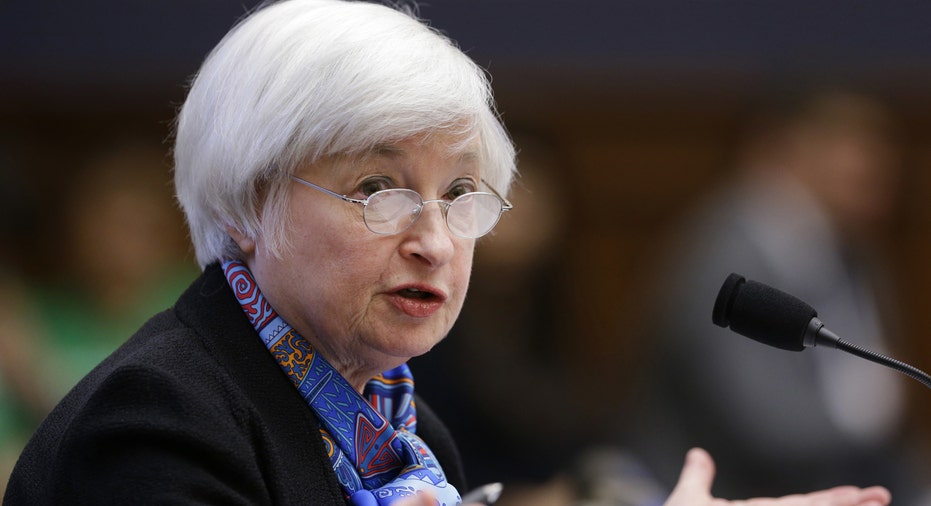Yellen Grilled Over Fed Operations, Independence During Testimony

House Republicans lit into Federal Reserve Chairwoman Janet Yellen on Wednesday, criticizing what they said is a lack of independence at the central bank and grilling her on its interest payments to big banks.
On the second day of her semiannual monetary policy testimony, House Financial Services Committee Chairman Jeb Hensarling (R., Texas) pressed the Fed chairwoman to justify how much interest the Fed pays banks on the excess reserves they keep at the Fed, one of the tools the central bank uses to manage short-term interest rates.
"I believe Congress created (interest on excess reserves) for one purpose, and it appears that the Fed is using it for another purpose," Mr. Hensarling said.
Mr. Hensarling suggested it was inappropriate for the Fed to pay interest exceeding its own benchmark federal-funds rate, saying the policy "favors a few at the expense of many and weakens economic growth for many Americans."
Ms. Yellen defended the central bank's legal authority to use the payments to manage short-term rates -- and said the difference between the rate on reserves and the fed-funds rate is "really quite small" and in line with the general level of interest rates. She added there is likely to be a small gap "for quite some time."
Both Republicans and Democrats peppered Ms. Yellen with questions about big banks' resolution plans; the labor-force participation rate; the coming referendum in the U.K. on whether to leave the European Union; and whether the Fed's own balance sheet should undergo "stress tests" to gauge its resiliency.
Ms. Yellen kept pace and even pushed back, at some points finishing her answers even as some GOP lawmakers tried to talk over her.
"I do not think stress testing our balance sheet is something that's necessary, but nevertheless we have done so and we've reported publicly the outcome of such stress tests," she said.
She also dismissed the suggestion the Fed could end up with "negative income," in part because of its huge balance sheet. "It is certainly not inevitable," she said.
Republicans also pressed the Fed chief on whether the slew of regulations implemented in the wake of the 2010 Dodd-Frank law, as well as potential additional enhancements to banks' minimum capital rules, could be harming the economy.
Rep. Sean Duffy (R., Wis), a vocal Fed critic, asked the Fed chief why she doesn't identify regulation as an economic headwind. Ms. Yellen said the those effects are very hard to quantify.
"I actually don't think it's the most important headwind," Ms. Yellen said. "It may be a headwind."
The sharp exchanges stood in contrast to her first day of testimony before the Senate on Tuesday, where lawmakers asked pointed questions but were largely cordial. Ms. Yellen's appearances before the House have tended to be more acrimonious, especially on issues of Fed independence, transparency and accountability.
On Wednesday, Mr. Hensarling also accused central bank officials of being "complicit in Obamanomics because it has lost much of its independence from the administration."
Mr. Hensarling decried a "noticeable revolving door between the White House, Treasury and the Fed," and said Ms. Yellen meets regularly with Treasury Secretary Jacob Lew, repeating a complaint Republicans lobbed at the Fed chief last time she visited Capitol Hill.
He also blasted the Fed officials' "data-dependent" monetary policy strategy, which "says nothing about which data matter, let alone how they matter."
Asked about the so-called Brexit vote set for Thursday, Ms. Yellen repeated her comments that a vote to leave the European Union could lead to volatility in world markets that may have negative effects for the United States.
On the economy, Ms. Yellen largely stuck to her message from Tuesday, emphasizing that she expects economic growth to pick up, and cautioning that lawmakers shouldn't place too much emphasis on one weak jobs report, such as the most recent one which showed the U.S. created only 38,000 jobs in May. She also repeated her concerns that the economic recovery has been uneven for some demographic groups, including African-Americans and Hispanics.
By Kate Davidson



















